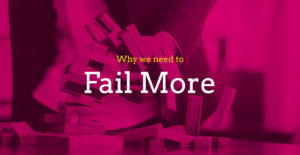 “Failing fast” has become a bit of a buzz phrase. What does that even mean though? Why do we need to fail and why is it so hard for us to do so?
“Failing fast” has become a bit of a buzz phrase. What does that even mean though? Why do we need to fail and why is it so hard for us to do so?
When I think about how to live my life, and what I want to do, I’m stunned by how often it can change. I’m stunned by how often, and how drastically I’ve changed. Not just during the past 18 months but throughout my life. No matter how sudden it’s seemed, I know my life (and probably yours too) has never changed in a single huge, life defining moment. It’s changed a little, every day, and a lot in the quiet seconds that tick by unmarked and unnoticed. I’ve never experienced a moment of clarity on a mountain top or even a pandemic epiphany. But I know that it’s in taking risks and doing things I did not initially think I could do and making mistakes as a result that I’ve learned and gained the most.
Why do we need to fail every day?Because this is how we grow and learn in the fastest way. But also because by making sure we fail every day we will start to take more risks and realise that “it’s ok”. We also become more resilient. The most successful people in life have failed the most times.
We actually fail generally most days anyway if you think about it: I fail at communicating with those closest to me. I fail at listening more than I speak. I fail at making those around me feel like they are important and deserve my undivided attention when they are having a conversation with me. I fail at completing all the things I need to in a day. I am imperfect and always will be. I also used to fail to get many of the bids I wrote for consultancy work but if I didn’t write at least 30 a year I would not win the 3 or 4 that I did win. I’ve failed at making presentations and hated them and now I welcome the opportunity to present. If I hadn’t experienced failure I’d have been too afraid to even think about having my own podcast. Because of fear of failure.
 Why do we fear failure so much? – Unfortunately, because we fear it so much, the fear of failure itself causes procrastination, avoidance behaviour, overwhelm and inaction. There are many many things we just don’t do because we are afraid that we will fail. The only way you can get over what fear causes is to get out there and fail. Think about how a baby learns to walk – they’re not afraid by the way so that means fear of failure is a learned behaviour. As infants we would never learn to do anything if we didn’t have the ability to repeatedly go through the try, fail, learn, adapt, try again cycle. Babies have no experience based evidence to draw on so they will continually explore their world, experimenting freely, with no preconceived ideas about what the outcomes might be. They’ll repeat the try, fail, learn, adapt, try again cycle until they get the results they want. As we grow up, soaking up the evidence from our endeavours and experiences, we start to pre-empt how our experiments with the world around us are likely to turn out. What is likely to work and what isn’t. We begin to base our decisions on this reduced pool of likely outcomes, unwilling to let go of what we think will work, becoming more and more cautious about experimentation.
Why do we fear failure so much? – Unfortunately, because we fear it so much, the fear of failure itself causes procrastination, avoidance behaviour, overwhelm and inaction. There are many many things we just don’t do because we are afraid that we will fail. The only way you can get over what fear causes is to get out there and fail. Think about how a baby learns to walk – they’re not afraid by the way so that means fear of failure is a learned behaviour. As infants we would never learn to do anything if we didn’t have the ability to repeatedly go through the try, fail, learn, adapt, try again cycle. Babies have no experience based evidence to draw on so they will continually explore their world, experimenting freely, with no preconceived ideas about what the outcomes might be. They’ll repeat the try, fail, learn, adapt, try again cycle until they get the results they want. As we grow up, soaking up the evidence from our endeavours and experiences, we start to pre-empt how our experiments with the world around us are likely to turn out. What is likely to work and what isn’t. We begin to base our decisions on this reduced pool of likely outcomes, unwilling to let go of what we think will work, becoming more and more cautious about experimentation.
We no longer try out different ways of doing things.
I believe that in order to get good at the big things you need to get better at little things. If you don’t fail every day you will never be able to deal with the bigger failures. So this is where saying YES more comes in. As soon as I was asked by my publisher to do create a podcast, for example, my answer was YES because I knew I’d have the resources to figure it out. So say YES more to things where your normal default response might be “no, I can’t do that”.
Put yourself in situations where you might get rejected – i.e. offer to help with something, ask someone out OR put yourself in situations that scare you just a little bit – try a new skill that’s outside your comfort zone, learn another language, speak to a stranger, sing a solo and let your voice crack. There are any number of ways.
Learn and fail – we all had to figure out how to do things online, including successful training and meetings. Along the way we stumbled and messed up and worked it out. But so often we’ll choose to not do something because we can’t bear that initial feeling of incompetence before we become competent. Yet we need it.
In his research for NASA, clinical psychologist Raphael Rose discovered that failure is key to creating resilience. He explains how leaning into trials and setbacks builds the emotional callouses that help us value what’s good in life.
